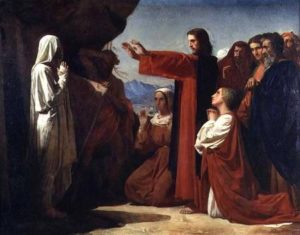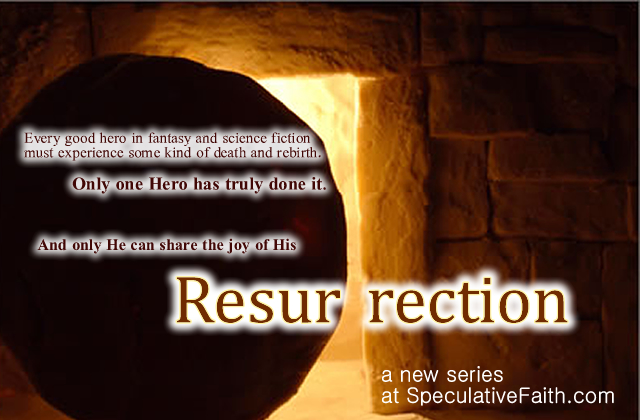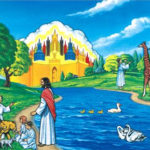Resurrection, Part 1: Prelude
Just once I would like to see one of those stereotypical sidewalk-religious persons striding about inside a sandwich-sign with hand-scrawled words that read like this:
RESURRECTION IS COMING. ARE YOU READY?
Not “the end is coming.” Not “the apocalypse is coming.” Certainly not anything like “the Antichrist is coming” — which, judging from popular Christian end-times rhetoric, means that the Beast locking you out of the economy is a far worse fate than any suffering in Hell.
And maybe not even “Jesus is coming.” Only, Resurrection is Coming.
People hear “the end” or “apocalypse” and they will think Roland Emmerich disaster films, tabloids, liberal global-warming doomsaying, or perhaps the latest dystopian “long ago our Earth got nuked by aliens/disasters and now Will Smith and/or Tom Cruise returns to the wasteland” movie trailer. Even that may be more accurate than when people hear “Jesus” and think of any number of imaginary saviors (some slightly more Biblical than others).
But if you say “resurrection is coming,” that may just make people wonder.
Resurrection reflections
Pop culture has many reflections of resurrection. By now hasn’t every comic hero died and come to life? (Summer-2012 film spoilers here:) Didn’t both Tony Stark in The Avengers and Bruce Wayne in The Dark Knight Rises “die” and “resurrect”? And in classic epic fantasy, of course, Aslan, Gandalf the White, and even Harry Potter “rose again.” Death and rebirth (or resurrection) are so embedded in people’s psyches that you do not even need to explain the concept when it recurs in a novel, film, or television series. Oh, and no one seems to tire of it.
Yet these fictitious “resurrections” of fantastic heroes have their limitations.
“Hallelujah, Christ arose!”
Even in fiction, few characters live forever after defeating death.
Harry Potter will eventually die a natural death.1 Gandalf the White goes to the Gray Havens.
Technically any of these heroes (with the exception of Narnia’s Christ-supposal Aslan) experience a metaphorical rebirth or something less than resurrection. If they do literally return to life, technically they are resuscitated, not resurrected.
Even Jesus, when raising Lazarus and parents’ children back from death, did not resurrect them. He returned them to life as a foretaste of the true resurrection, the future eternal life.
Any real-life human resuscitation, any fictitious passage from death to life, any reference to “resurrection” in boosted product sales or James Bond movie trailers — they all spring from the First and only true resurrection, and the only real and fixed resurrection so far.
Our only hope
 And for the Christian, Scripture is clear: without Christ’s resurrection, we have no hope.
And for the Christian, Scripture is clear: without Christ’s resurrection, we have no hope.
“If there is no resurrection of the dead, then not even Christ has been raised. And if Christ has not been raised, then our preaching is in vain and your faith is in vain.”
1 Cor. 15:13-14
Picture that. The Apostle Paul, who loved to preach about Christ’s substitutionary death on the cross for sinners, who insisted we should add nothing to the Gospel, clearly states that nothing matters, none of it us true, all that is overthrown if Jesus didn’t rise from the dead.
I love the truth that Christ suffered and died as the only perfect sacrifice for rebel sinners on Good Friday. But just as much I love the truth that He rose on Resurrection Sunday.
Does it ever seem to you like Christians emphasize Good Friday over Resurrection Sunday?
Or that if we do discuss resurrection, we limit this to Christ’s capital-R Resurrection?
Or if we do discuss human resurrection, we stop short of dreaming, even speculating on it?
Or if we do wonder about human resurrection, we little anticipate creation’s resurrection?
 Yet Biblically, there is not only one promised Resurrection, but three:
Yet Biblically, there is not only one promised Resurrection, but three:
- Christ is risen.
- Humans are risen, and will rise.
- Creation itself will rise.
That is what this new four-part series will cover, starting next week with Christ is Risen.
What other fantasy-fiction resurrections are your favorites?
What did you grow up believing about Biblical resurrection?
- Or here is a sad thought: after all that he has been through, Harry as a Ministry Auror could fail to block a single deadly curse while conducting a simple dark-magic artifact raid. ↩












































Thanks for this blog. Sort of gets me going not just for easter but in my writing. I like your goals as stated above, to explore and enjoy epic stories that reflect the truths and beauties of the first and greatest Epic Story, God’s Word. Thank you for making that stand for Christ. So much of what I see at Wal Mart is horrid or torrid. Three of my fellow workers are into vampire games, role play, etc. So much darkness in our world. Makes me wonder how many writers are interested in writing about His Light over darkness in order to compete in the market place against that which is evil? That is my goal. Thanks for Speculative Faith. Terry Palmer
Good stuff, Stephen. I’m glad to see you bringing up this subject and look forward to reading the rest!
I have to say, my all-time favorite story of resurrection is Stephen Lawhead’s Song of Albion trilogy. Our hero dies and is resurrected not once, but twice (thrice, if you want to get metaphysical about the climax of the first book)–and the scope of salvation gets bigger every time it happens. Makes me wonder who I’m dying to save… 🙂
I would argue that Gandalf in The Lord of the Rings really is resurrection, not mere “resuscitation”; he’s “sent back” changed from what he was before (“Indeed I am Saruman, one might almost say, Saruman as he should have been … I have passed through fire and deep water, since we parted. I have forgotten much that I thought I knew, and learned again much that I had forgotten. I can see many things far off, but many things that are close at hand I cannot see.”), and he goes to the Grey Havens (or, rather, thence to Valinor) because his job was to be the Enemy of Sauron and Sauron is finally gone forever, rather than because he would otherwise eventually die. (After all, true death is “the gift of Men,” rather than “the gift of those-other-than-elves.”)
Mmm … In any case, there’s a fascinating science fiction story (A Canticle for Leibowitz—which I haven’t read, but my dad’s told me quite a bit about) that includes him as a (minor) character in an after-the-atomic-wars setting, positing (since “it is given to man to die once …”) that, having been resurrected, he can’t die again.
Turning away from fiction: While the complete renewal and resurrection of human beings and the creation is something we won’t see in its final form until the end, and so is indeed something to be looked forward to with eager anticipation, it’s not at all clear that “the renewal of all things” is limited to the eschaton, rather than a gradual working-out of the Resurrection in the world through Christ’s body the Church.
Also, somewhat trivially:
In the circles in which I now move the most, it’s all muddled up together, with Good Friday as part of “the Easter season” (like Advent is part of “the Christmas season”), making me long for the church I attended in college where each was given its proper weight but in its proper place—and, even better, every Sunday was celebrated to some extent (but explicitly so) as a “mini-Easter.”
Resuscitation. That was the word I had been seeking. In fact, I’ll make the corrections above, thanks to your comment, Jonathan.
That’s what I hope to explore especially in part 3, which will discuss the fact that Christ’s people have already died and been raised spiritually with Him — we now only await our physical death-and-resurrection, along with that of the creation itself.
Resurrection is split right down the middle, perhaps as described by that slightly famous doctrine-wonky phrase “already and not yet.”
Precisely. (I usually see that phrase with some punctuation mark—a dash, a semicolon, or a slash—instead of “and,” though.) Or, like the church I now attend likes to describe sanctification, “we have been raised with Christ, we are being raised, we shall be raised,” and “creation has been renewed, creation is being renewed, creation will be renewed.”
I’d thought you had used the word “resuscitation” at least once in the post originally, since I remember scrolling back and forth at least once to see what word you’d used, but perhaps the result of that vanished in a revision.
The original word I used was revitalize. I’m not sure why I originally thought of that instead of resuscitate.
This post actually led me to go back to the Speculative Death discussion from about a year ago and see what we were saying there…